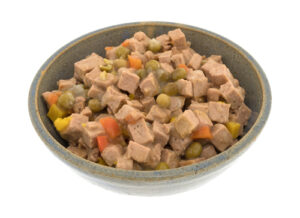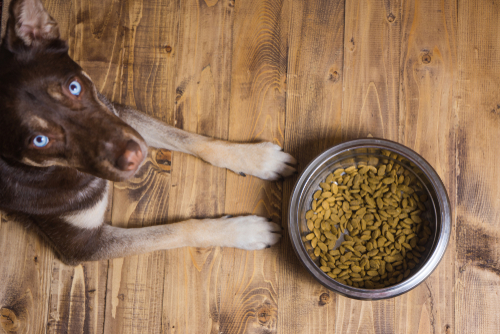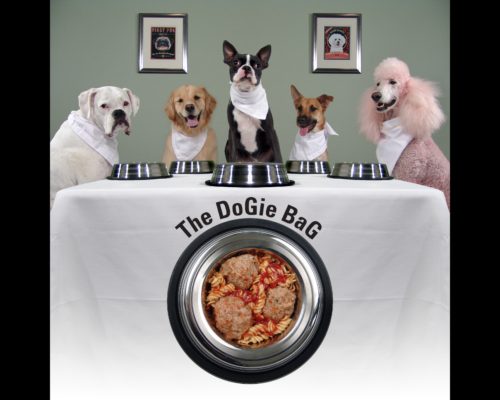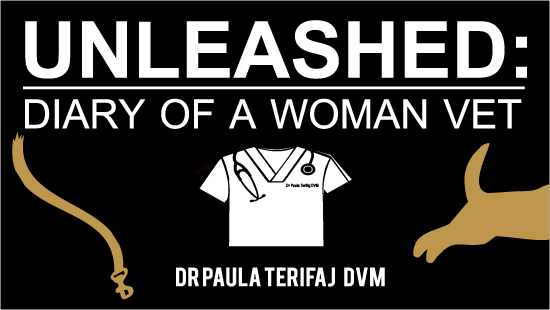On June 27, 2019, the United States Food and Drug Administration (FDA) released an update to two previous advisories regarding grain free diets and dogs who had developed dilated cardiomyopathy (DCM) linked to cardiac deaths. The release made a splash in the mainstream news: “THERE ARE 16 BRANDS OF DOG FOOD THAT ARE KILLING DOGS!” But there is much more to worry about. Feeding commercial pet food, generally speaking, carries inherent risks. And, as readers of this blog will know, it’s my hot button!
If you follow alerts about pet food recalls, these warnings usually point out bacterial contamination or some other toxin that found its way into the batch. Too late, your pet is sick or dead. That’s because manufacturers do not test their products, nor does any agency require them to produce safe products. But here’s the twist I’m betting most pet owners are not aware of – commercial pet food diets have been found to be deficient in key nutrients. It’s not only what is in the bag or canned food that can be deadly, it’s also what is not.
The moment I got wind of this report, it was déjà vu the late 1980’s when it was discovered why felines had been dropping like flies for years. It made such an impression on me that I wrote about an experience I had (chapter six) in Unleashed: Diary of a Woman Vet. Dilated Cardiomyopathy (DCM) is a disease of the heart muscle that can lead to heart failure over time or sudden death. To read the statement that formulated pet foods are “complete and balanced” cannot be true. Read on as I give yet another explanation.
The 16 companies named by the FDA dates back to 2014 when the FDA was first alerted – see the list below. No, the year 2014 is not a typo. This deadly storm has been brewing for more than five years. There are countless victims, and more to be counted, as researchers continue to tell us the truth.
Acana
Zignature
Taste of the Wild
4Health
Earthborn Holistic
Blue Buffalo
Nature’s Domain
Fromm
Merrick
California Natural
Natural Balance
Orijen
Nature’s Variety
NutriSource
Nutro
Rachael Ray Nutrish
 Here is what we know from the latest report: Grain-free diets (those containing peas and/or lentils, chickpeas, and other legume seeds) represented more than 90% of the products implicated. Though these non-grain foods have been present in pet foods for at least a decade, the newer grain-free formulas carry a much higher percentage of them. There are a number of animal nutrition experts speculating about why some dogs who have been eating them have developed heart problems.
Here is what we know from the latest report: Grain-free diets (those containing peas and/or lentils, chickpeas, and other legume seeds) represented more than 90% of the products implicated. Though these non-grain foods have been present in pet foods for at least a decade, the newer grain-free formulas carry a much higher percentage of them. There are a number of animal nutrition experts speculating about why some dogs who have been eating them have developed heart problems.
Veterinary cardiologist Dr. Joshua Stern from the University of California at Davis has been studying the rise in cases of DCM in Golden Retrievers, including a potential dietary link. Stern concluded that many cases of DCM in Golden Retrievers have been caused by a taurine deficiency – a page right out of the feline playbook! Taurine is an essential amino acid naturally present in meat and other food stuffs like diary. Pet food manufacturers got a slap on the hand and upped the taurine levels in their feline formulations. The cat was the canary in the dietary coal mine.
We don’t yet know if specific breeds carry a genetic risk factor since Goldens are one of the most popular breeds in America – hence there are more of them. Also, within the canine population, other shapes, sizes and ages have been affected. Therefore, other breeds including my favorite – the mutt – have died or are receiving treatment.
I believe that the editors of the Whole Dog Journal are a trusted authority for all things canine – but we do have our differences on diet. My opinion will follow.
The Whole Dog Journal weighs in on this subject:
For now, we would strongly recommend avoiding foods that use peas – including constituent parts of peas, such as pea starch, pea protein, and pea fiber, and especially multiple iterations of peas (such as green peas, yellow peas, pea protein, etc.) as major ingredients. Same goes for chickpeas (may be referred to as garbanzo beans), any other type of bean, and lentils. We’d switch away from any foods containing more than one of these ingredients: peas, beans, or lentils. We’ve said it before, and we will say it again: switch foods frequently, and not just from one variety to a different variety made by the same company. Switch among products that are made by different companies, with different ingredients. Somehow, the message spread among dog owners that grain-free foods were “better.” We believe that unless your dog has a proven food allergy, switching from one food to another, as often as every time you buy a new bag of food, helps provide your dog with “balance over time,” and keeps any nutritional imbalances, overages, or deficiencies from contributing to your dog’s health problems.
Switching to different pet food brands as often as every time you buy a new bag helps provide your dog with “balance over time” and keeps any nutritional imbalances, overages or deficiencies from contributing to your dog’s health problems. Really? However, if that is the best dog owners can do, then I understand their advice. But I have a different recommendation: feed fresh sources of meat protein to that hungry hound that is starring you down for your cheeseburger! Like it or not, you are living with a carnivore asking, “where’s the beef?”
Now’s the time for me to make a confession. Before I gave up the kibble habit, my dogs enjoyed what I called; a modified diet. It’s was more of a compromise but adding them to the grocery list eased my conscience. Each week I stocked my fridge and pantry with cooked chicken, eggs and canned fish (sardines, salmon and mackerel). I rotated these goodies, so they got either the bird, eggs or fish each day. So, what do these natural foods all have in common? Essential nutrients like the amino acid – you guessed it – taurine! Real foods or what some folks are still calling it – people food. How Pet Food Companies and AAFCO Mislead Consumers Making Pets Sick
Here’s what I learned back in grade school on the subject of nutrition: eat a variety of fresh wholesome foods if you want to stay healthy. And because I like to have the last word, let me leave you with this question: What is the “complete and balanced” diet you eat?
What to do if your dog is diagnosed with DCM:
- Ask your veterinarian to test blood taurine levels.
- Report the findings to the FDA.
- Seek guidance from a veterinary cardiologist – it can take multiple months to see improvement.
Statement from Nutrition Support Services at UC Davis Veterinary Hospital
Side note: The FDA is open to additional opportunities for collaboration and welcomes the submission of any information that may aid in our investigation. Detailed instructions for submitting case information can be found on “How to Report a Pet Food Complaint.”





